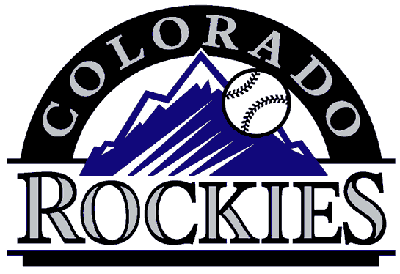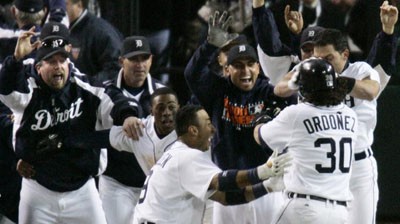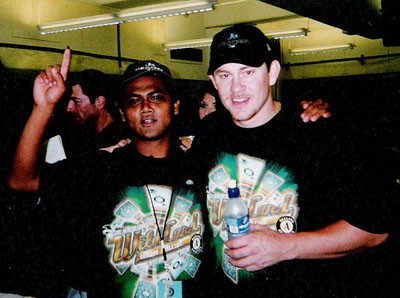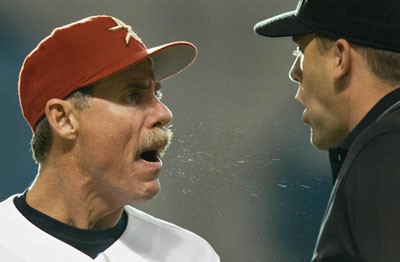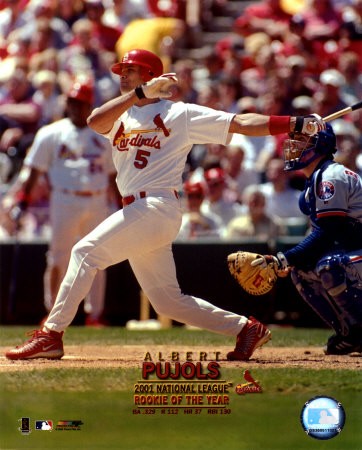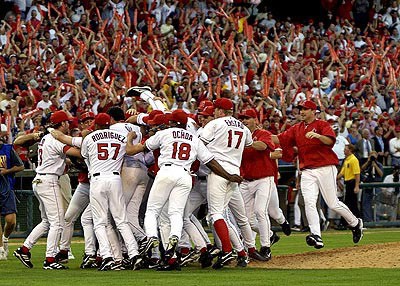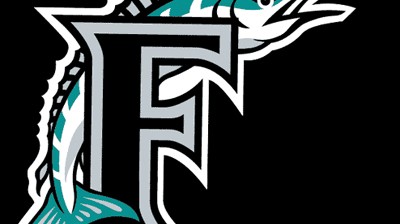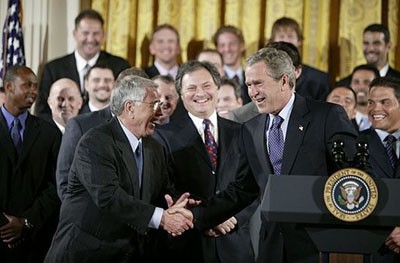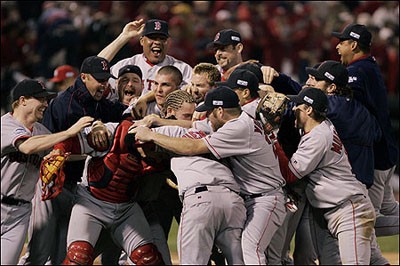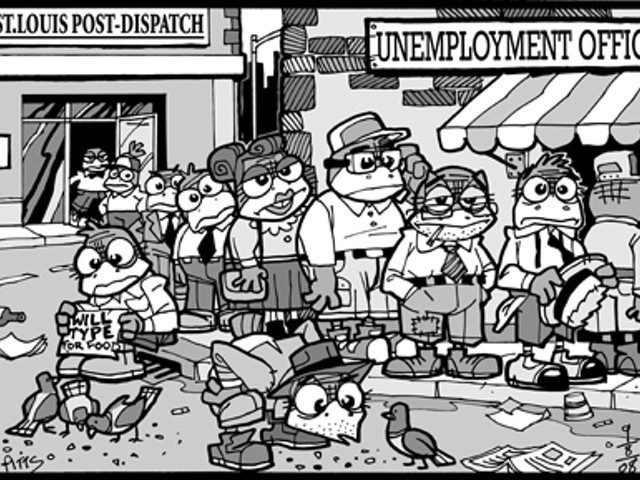Wild card season is upon us. That time of the year when the division races are mostly sewn up, and you start looking at teams from all over the league, trying to keep track of half a dozen different schedules all at once.
However the Bud Selig era in baseball is eventually remembered, it will inevitably be based on two things: steroids and the wild card.
We're already seeing now how history is going to judge Bud's handling of steroids, and folks, it ain't pretty. On the other hand, the realignment that Selig shepherded in, which created the three division system and the wild card, is much more of a mixed bag. Purists still hate the WC, pining for the days when winning the division really meant something, other than the chance to play the hottest team in the league in a five game series. Others love the excitement it brings to the game; that drama that goes to the very last days of the season most years. And when it comes right down to it, the wild card was created for just that purpose; to create excitement. You may not like it, but the wild card has done its job.
In honor of this particular wild card season, I thought we might take a look back at some of the other wild card winners over the years. Of all the teams that have won their way through to October by virtue of the wild card, I selected what I consider the ten best. Or maybe the ten most intriguing. Or the ten most surprising. Eh, I'm not sure exactly what these ten are, to be completely honest. Some of them have been truly outstanding teams. Some have been shockers you never saw coming. Some have been historic. All of them, though, have a story to tell.
10. 1995 Colorado Rockies: The '95 Rockies were a fun bunch, unless, of course, you were an opposing pitcher. The original Blake Street Bombers, this team featured the likes of Larry Walker, Dante Bichette, Andres Gallaraga and Vinny Castilla. Playing in a brand-new stadium going by the name of Coors Field, this pre-humidified baseball monster scored 785 runs in only 144 games.
More importantly, this team was the first playoff team from the new expansion franchises that had come into the league in 1993. The Florida Marlins and the Rockies had both been added that year, and the Rockies were first out of the gate to reach the playoffs. With attendance well over 3 million in 1995, the Rockies were the first wild card team that really mattered.
9. 2006 Detroit Tigers: It had been a long time coming for the city of Detroit. The Tigers, one of the most storied franchises in all of baseball, had not made a post-season appearance since 1987, the year of Kirk Gibson and Alan Trammel. By the time 2006 rolled around, Gibson was much more known for a pinch-hit off Dennis Eckersley (which was accompanied by the greatest call in the history of sports, in my ever so humble opinion, that of Jack Buck, who didn't believe what he had just seen), and Trammel had been deposed as the manager of the Tigers just the previous winter, in favor of Jim Leyland.
But in 2006 that all changed. The Tigers, buoyed that season by the performances of rookie phenom right-hander Justin Verlander and a lineup that featured 30+ home runs power from their No. 9 hitter, Brandon Inge, jumped out of the gate early and roared through most of the season with one of the best records in all of baseball. They were caught on the last day of the season by the Minnesota Twins, part of a September swoon that had fans in the Motor City wringing their hands and wailing outside the gates of the old Tiger Stadium.
In the playoffs, though, the Tigers lost the first game of the Division Series to the heavily favored New York Yankees, and then they got pissed. Detroit didn't lose another game until they reached the World Series, taking the next three from the Yanks and four in a row from a remarkably good Oakland Athletics ball club. It was a franchise record, those eight post-season wins in a row, and it heralded the rebirth of baseball in one of the oldest cradles of the game. The Tigers eventually lost to a Cardinal team led by a game one masterpiece from a young pitcher with a flat hat brim, but that didn't ruin the story, nor the season.
8. 2001 Oakland Athletics: Alright, let's get something out of the way here. This team should be much higher on this list. The 2001 Athletics are the only wild card team to ever win 100 games, and they were a truly stunning bunch of players. Unfortunately for them, they also happened to play in the same division as the Seattle Mariners that year, who won 116 games. And, also unfortunately, they simply couldn't win a post-season series against the Yankees, relegating them to a much lower spot on this list than I would like to give them.
This was an Athletics team of staggering talent. This was the Big Three at their collective best, with Mark Mulder finishing second in the Cy Young voting that year to Roger Clemens, hurling four shutouts on the year. Johnny Damon patrolling center field and Miguel Tejada manning short. This was Jason Isringhausen (pictured above) finding where he belonged, closing out games with high 90s heat. This was, in short, a juggernaut of a team.
The Athletics that year outscored their opponents by almost 240 runs, a staggering number. They had what looked to be the second coming of the great Atlanta rotations of the early '90s. They had an offense that reads like a who's who of big-time free agents of the past half decade. And yet, at the end of it all, they'll be remembered as much for their failures as their triumphs. This team really should have been higher on this list.
7. 2004 Houston Astros: The first of several teams to make ridiculous late season runs, the 2004 Astros were another powerhouse team that just happened to play in a division with an even bigger powerhouse, the Cardinals. At mid-season, the Astros fired their manager, Jimmy Williams. They handed the reigns over to Mr. Mustache himself, Phil Garner. On the 14th of August, the 'Stros were four games under .500 and severely under-performing. A pitching staff with Roger Clemens, Roy Oswalt, and Andy Petitte should never even sniff being under par.
From the middle of August through the end of the season, Houston went 36-10, highlighted by a twelve game winning streak that closed out the month of August and ushered in September. They still finished thirteen games behind a St. Louis team that won 105 games that year, but they more than made up for that in perhaps the greatest NLCS of recent times, a seven game epic that featured the emergence of Carlos Beltran and the dramatics of Jim Edmonds. The 'Stros made it all the way to the World Series the next year, but in my mind, this was the better team.
6. 2007 Colorado Rockies: On the 16th of September, the Colorado Rockies beat the Florida Marlins in a laffer at Coors Field, 13-0. The crowd was sparse, a little over 19,000, as the Colorado faithful watched two teams without real playoff hopes square in mid-September. To make matters worse, the Rockies had only managed to win one of three from the Marlins, one of the bottom-feeders of the National League. The Rockies were 6.5 games behind the division-leading Diamondbacks, and well out of the wild card race. The season was winding down.
On the 30th of September, the Rockies' season ended, with a 4-3 win over those same Diamondbacks. Since that game against Florida, two weeks earlier, the Rockies had lost only a single game. They had come up but a single game short of tying Arizona, and were tied with the San Diego Padres for the wild card lead. The season was just beginning.
On the first of October, the Rockies beat the Padres in a one game playoff to clinch their first playoff berth since 1995. They mowed down the Philadelphia Phillies in three games and then roared through the Diamondbacks in a four game sweep. When the dust had settled, the Rockies had won twenty one of their last twenty two games to reach the World Series for the first time in franchise history. All in all, not a bad run. Even an ignominious sweep at the hands of the Boston Red Sox couldn't put a damper on the Rockies' spirits. It was one of the greatest runs in the history of baseball.
5. 2001 St. Louis Cardinals: You can call me a homer on this one if you like. Go ahead. I can take it. Still, I think this team belongs here, and nothing you can say is going to convince me otherwise.
2001 should go down in history as the year of the wild card. In the American League, you had the Oakland Athletics winning over a hundred games and still finishing runner up, and in the NL you had the Cardinals, who finished tied with the Houston Astros for the division lead and ended up with the wild card by dint of the season series between the teams. The Cards still hand their "Co-Champions" banner up every summer, though, irritating the Astros to no end.
In a way, the 2001 post-season was really a tragedy. You had two superior teams in the AL both folding when confronted with the big, bad Yankees, and the two best teams in the National League just happened to play in the Division Series.
And what a series it was. In my ever so humble opinion, the 2001 NLDS is probably the greatest Division Series ever played. It was the eventual champion Diamondbacks, led by their twin aces Randy Johnson and Curt Schilling, going up against the Matt Morris and Darryl Kile led Cardinals. Never before, or since, has five games felt so truly epic. Cecil DeMille would have had a tough time coming up with a better baseball script than the one the Cards and DBacks wrote that October, as some of the truly great pitching performances in postseason history were turned in on both sides.
An emerging young rookie by the name of Albert Pujols also just happened to lead the Cardinal offense that year. Just a bonus, really, considering how it all turned out.
4. 2002 Anaheim Angels: A team that began a run of three consecutive wild card World Series winners, the Angels presented an interesting dynamic to the world of baseball, one that had been nearly forgotten in the era of the longball.
The 2002 Angels won not by pounding the ball out of the park, but by preventing their opponents from doing so. An outstanding pitching staff, led by a young rookie right-hander named John Lackey and a shutdown bullpen, led by closer Troy Percival, largely defined this team. Well, technically, the team was defined by the Rally Monkey, but you get the picture.
The only member of the 2002 Angels to hit 30 home runs was Troy Glaus, and he just barely got there with 30. Even so, the Angels ranked fourth in the league that year in scoring. If ever a team could truly make a case for being clutch, this was surely the one.
In the post-season, the Angels' bullpen was the star, specifically a young phenom from Venezuela by the name of Francisco Rodriguez. Rodriguez nearly single handedly ruined the Yankees' season that year by shutting them down night after night in the Division Series, earning himself his own wing in the New York Hall of Baseball Villains.
The Angels defeated the Giants of Barry Bonds in a seven game war of attrition to bring a championship to the people of Anaheim. Then, of course, they forgot what in the hell they were supposed to be called.
3. 1997 Florida Marlins: The team that began it all for wild card teams, the '97 Marlins were the first to win a title after getting in via the WC.
The thing is, though, there really isn't all that much noteworthy about this Marlins team otherwise. They beat a very good Cleveland Indians team in the World Series behind the legendary Charles Johnson at catcher and Gary Sheffield. They brought Jim Leyland his first championship ring. Yet still, this is a team all too often forgotten. The pitching was nothing to write home about, really, though Kevin Brown had an outstanding season (one of his last, in fact), and a Cuban refugee named Livan Hernandez brought his blazing mid 80s fastball to America for the first time. The offense was solid, if unspectacular, anchored by Sheffield and Mr. Marlin, Jeff Conine. A young shortstop named Edgar Renteria made his mark on the season with the hit that won the Series.
In the end, though, it's alright that we maybe don't remember this team. It was a good but not great team that just happened to win it all. Yet this was also the team that lent true legitimacy to Bud's Grand Experiment, the first wild card team to win it all.
They may not have been truly memorable, but they should never be forgotten.
2. 2003 Florida Marlins: The second of three consecutive wild card World Series Champions, sandwiched by the '02 Angels and the BoSox of 2004, the 2003 Marlins team will forever be remembered as much for who they beat as for the team that they were themselves.
The Great Yankee Dynasty of the late 90s technically ended in Arizona, in October of 2001, when Luis Gonzalez blooped a single over the head of a drawn in Derek Jeter. The true end of the dynasty, though, didn't come until two years later, when Josh Beckett put on one of the truly great performances in postseason history. 2003 was the year that the Yankees stopped being The Yankees.
Even without all of that, though, the '03 Marlins were certainly worthy of being here on their own merits. Pudge Rodriguez added to his Hall of Fame resume by leading an inexperienced pitching staff to postseason glory. And how about those pitchers? Brad Penny was the horse of the staff, as he chewed up innings and tied for the team lead in victories with 14. Carl Pavano earned his next contract as the veteran leader of the staff. And the emergence of two young turks, Dontrelle Willis and the aforementioned Mr. Beckett, proved to be the engine that truly set this team moving.
The Marlins dispatched the Giants easily in the NLDS that year, three games to one, and then headed on to a meeting with Chicago. We all know perfectly well what happened in that series, as the name Bartman became forever etched in the memories of every Cub fan. When the smoke cleared, the Marlins moved on, victors in seven games, and the Cubs were left to lick their wounds and wander in the purgatory of year after year of hoping for a healthy WoodPriorZambrano.
The story of the World Series that year was one man, and one man only. Josh Beckett took over the series, earning his own spot in the Yankee Baseball Villain Hall right next to that of Francisco Rodriguez from the previous year. Pitching on three days' rest, Beckett tossed a complete game shutout, giving up only five hits to go along with nine strikeouts. For the series, Beckett threw 16.1 innings and went 1-1, with a 1.10 ERA. Not too shabby. Not too shabby at all.
1. 2004 Boston Red Sox: They broke the curse of the Bambino, and ended 86 years of suffering for a city and a people.
They became the first team in baseball history to come back from down 3-0 when they beat the Yankees four games straight to move on to the World Series.
They cleaned up against what was widely considered to be the best team in baseball that year, our very own St. Louis Cardinals.
They forever made a single, blood stained garment famous.
It hurts me to say this one. It really does. But there is no comparison, really. The 2004 Boston Red Sox are the greatest wild card team ever. And no other team even comes close.
So how will history remember the wild card? Tough to say, really. But whether it is ultimately hailed as a stroke of genius of derided as a cheap ploy to put asses in the seats, the wild card has, at the very least, given us some truly great moments. This list was an attempt to record some of the greatest of them. Hopefully, it succeeded. Each and every one of these teams was something truly special, in one way or another, and every one deserves to be here.
Of course, you could also argue they never deserved to be there in the first place, but that's an argument for another day, and another column.

